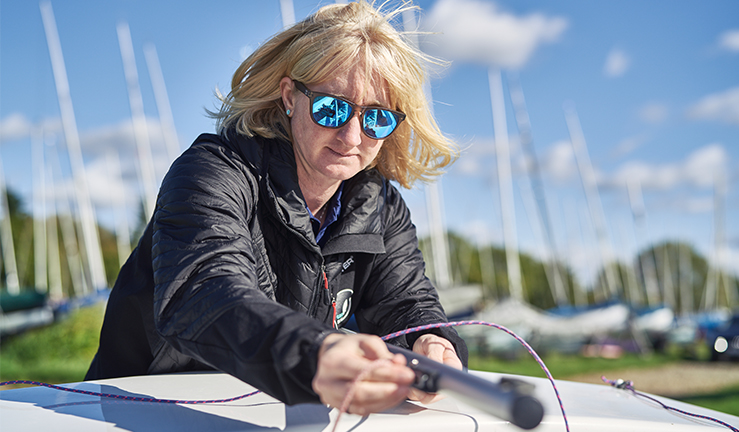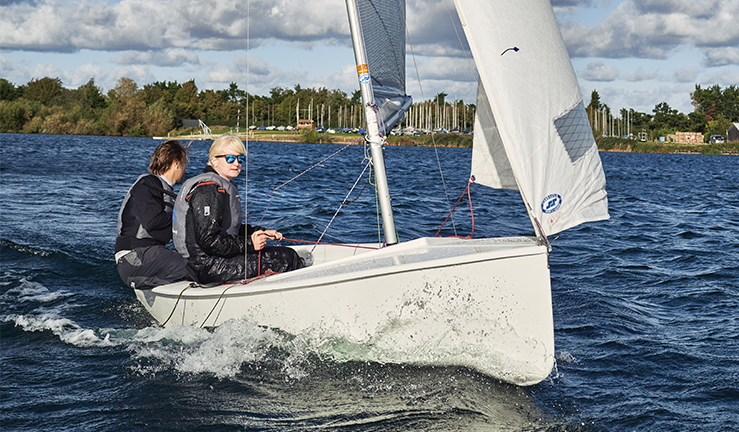Lucy's story

Despite being born with photophobia nystagmus (a condition that renders eyes unusually sensitive to light and subject to involuntary movements) and being registered blind since 1997, Lucy has never let her visual impairment slow her down.
“My parents were always so supportive,” she says. “It was very much normal life, get on with it.”
And she did. With an MBE, a charity and six consecutive gold medals in the Blind Match Racing World Championships and World Blind Fleet Racing Championships, Lucy is one of the most successful disabled sailors ever.
Getting started
When Lucy was 17 her uncle, a commercial ship’s captain, took her sailing and it was love at first sail.
“Because of my sight you could quite easily stay inside because things are too difficult,” Lucy explains. “There are things to avoid on shore, like bins on pavements or people. Sailing feels like freedom. You fold up the white cane and you’re stepping out. It’s a great sense of achievement, a massive buzz.”
Lucy went on to do the introductory RYA Sailability course and says: “Everything started from there.”
On day one of that weekend she sailed around the cans with an instructor. On day two she was on board a yacht, learning how to hank on sails and trim them. At the end of the weekend, the instructors asked her to join the Blind National Championships.
“I’d only been sailing triangular courses, but a week later I was on the helm,” she recalls. “I had to learn how to start a race, how to hike out. It was zero to hero.”
Completely hooked, Lucy returned home to enrol in an RYA Dinghy Level 2 course.
Freedom on the water
Whilst for many of, the thought of adjusting sails or steering a course while barely able to see might seem impossible, Lucy believes sailing is the ideal sport for the visually impaired (VI).
It helps that everything onboard has its place – cleats don’t move – but there’s more to it than that. People often talk about feel in sailing, but very few mean it as literally as VI sailors.
Lucy is in the B2 category of visual impairment, able to recognise a hand up to two metres away (normal sight averages 60 metres). On the helm she gauges wind angles from the sensation of breeze on her face and hair.
And without sight, she is acutely sensitive to changes in heel, to the sounds of sails luffing and flapping, to the vibration through a hull as a boat accelerates. She is probably more in tune with her boat than most sighted sailors.

Giving back
After securing gold in the Blind Sailing World Championships in Japan in 2013, Lucy was awarded an MBE. It was a huge surprise she admits: “I was so proud of the team. I knew the work that had gone in. Everything I do is for everyone in the team. It’s so that everyone can have the same opportunities I did as a 17-year-old.”
While Lucy had the skill and ambition to be the best, she is quick to acknowledge the formative role of the RYA in those early years.
“The instructors were so good,” she explains. “There wasn’t a big platform for blind learning back then but they learned on their feet how to make it work, getting an extra instructor for me so it didn’t slow the [sighted] classwork, working out ways I could do 99% of everything in the course like man-overboard drills.”
She says current RYA courses are so well structured they produce better sailors. They provide rigour: “You can do [non-RYA] zero-to-hero courses but do you have the experience to cope in a strong breeze or handle breakages?
“How the RYA has designed the courses to lead you through every stage, especially being able to prepare coursework online or listen to course audiobooks has made sailing much more accessible.”
That is the purpose of Lucy’s charity, Blind Sailing UK (aka GBR Blind Sailing as the national race team). Its goal is to support people of any level of visual impairment to get afloat, from first-timers on the RYA courses she runs, to elite racers with sights set on gold.
Breaking barriers
Lucy explains RYA courses for VI sailors aren’t entirely about learning to sail. They’re about confidence. “When I was 17, I remember being in tears about how to get home by myself. So today I try to answer all the thousands of questions that may stop people dipping a toe in. We allow people to put their trust in others and ask for help.”
Courses change lives. Lucy speaks of a former company director who became visually impaired but found a purpose (and saved his marriage) through sailing. A female sailor who considered suicide after losing her sight before she was helped back afloat. And a confident young woman who’d previously been too nervous to leave her house.
Lucy’s own condition fluctuates with stress and emotion. When the countdown guns fire before a race she becomes temporarily totally blind. “But I’ve got the trust in my ability and the guys to keep calm,” she explains. “That comes back to the RYA. It’s learning the skills correctly and knowing that no matter what happens that you can cope, that you’re in control.”
50 Years of RYA Training
The RYA introduced the dinghy and coaching schemes in 1970 to help clubs and sailing schools by providing a national syllabus and method of learning to sail. Fifty years on, the RYA has a network of more than 2,400 training centres in 58 countries and supports the delivery of over 100 courses.
To find out more about the 50th Anniversary and the history of the RYA training schemes, visit www.rya.org.uk/go/50years. For more information about RYA courses go to www.rya.org.uk/training.
